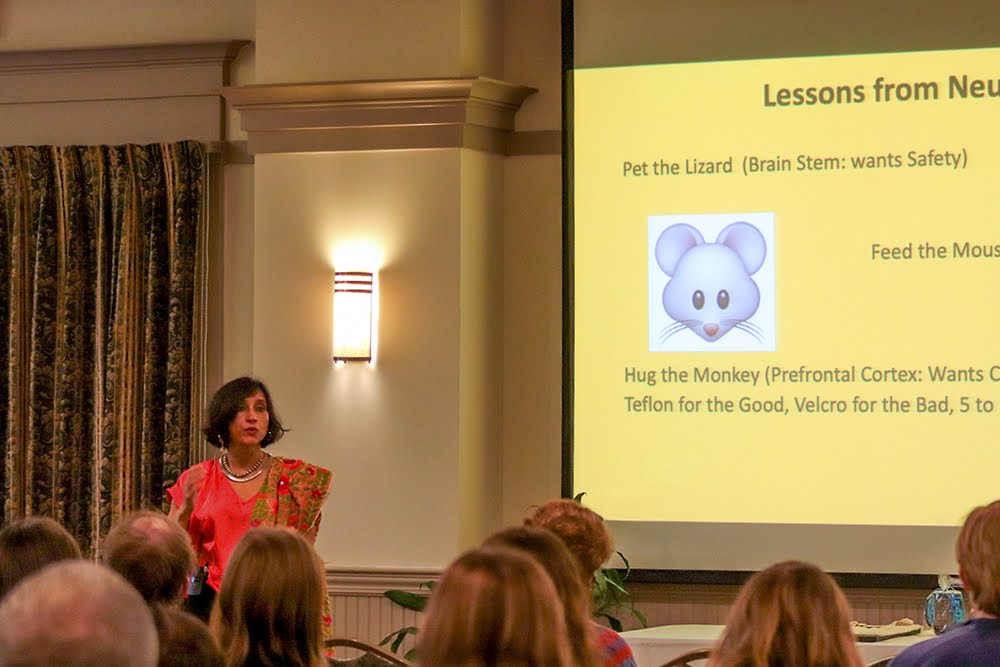On April 14, the 2022 Rezendes Ethics Lecture featured Dr. Vaishali Mamgain, who held a moving presentation titled “Self-Care and Radical Communion: Walking Each Other Home.” The lecture, which was held at the University of Maine’s Buchanan Alumni House, invited Rezendes Essay Ethics finalists, where the winner of the competition was also announced.
As a part of the John M. Rezendes Ethics Initiative, the lecture kicked off by announcing the finalists for the Rezendes Essay Ethics competition. This year’s competition invited undergraduate students at UMaine to write about the ethics of self-care.
The two finalists were Anna Lane, a fourth-year microbiology and biochemistry student, and Iris May-Fleming, a first-year journalism student.
The winning essay in this year’s John M. Rezendes Essay Ethics competition was titled “When We Cannot Care for Ourselves: Ethics, Interdependence and The Danger of The Self Care Message.” It was written by Elaine Thomas, a third-year Honors student majoring in management and minoring in music.
Following the award ceremony, Mamgain, an associate professor of economics and director of the Bertha C. Ball Center for Compassion at the University of Southern Maine held a lecture in self-care and radical communion. Mamgain is known for her work in contemplative pedagogy, and began with light meditation and breathing exercises that set a calming tone for the rest of her lecture.
“[During the lecture] you’ll see me dance back and forth between the neuroscience of self-care and practice and the larger questions of who we are and how we’re embedded in this world,” Mamgain said.
During the lecture there were several interactive activities to help listeners thoroughly understand the lesson. For the first exercise, Mamgain had the students draw a visual map that represented themselves and everything in their life that they feel connected to.
“The drawing accesses different parts of us and knits together different parts of our experience,” Mamgain said.
Mamgain went on to explain the neuroscience behind these individual experiences, discussing different parts of the brain that cause us to have instinctive reactions. She did this to emphasize the idea that, if we can identify what state we are in, we can figure out what exactly it is we need.
The brain stem is what she described as our “lizard brain,” with its primary concern being safety.
“When we don’t feel safe, we can’t care for others,” Mamgain said.
She then went on to describe the subcortex of our brain.
“That part wants to accomplish something, it wants satisfaction,” Mamgain said.
She calls satisfying this part of the brain, which wants a dopamine response, “feeding the mouse.” She meant that sometimes doing something, even if it’s for the benefit of others, can also be done to fulfill our own needs.
Our prefrontal cortex is what Mamgain described as our “primate brain,” explaining that our prefrontal cortex was meant to handle dangerous situations and apply solutions to our everyday situations.
“Our brain is wired to privilege negative information … so our brain has this ability to let the good stuff just slip off … it’s velcoro for the bad,” Mamgain said. “Anything bad that happens, the brain catches on to it. And this is a very startling and sad ratio. It is five to one. Five positive things have to happen in our lives and for us to just really know them before that one negative thing works off our brain.”
The lecture went on to talk about communion and the individual benefits of community and people coming together to be present and face challenges. Mamgain described an experiment that was conducted where both couples and individuals were asked to look at a mountain and wear a hiking backpack, then were asked how heavy they thought the backpacks were and how large they thought the mountains were. The couples in the experiment consistently perceived the mountains as smaller and the backpacks as lighter than the individuals in the experiment.
This highlights the importance of coming together even in terms of individual care.
The John M. Rezendez lectures are made possible by a generous gift made by Dennis Rezendes in honor of his father John. After Dennis’ passing in 2015, his legacy of honoring family, ethical beliefs, supporting the performing arts and more is also carried on by his wife Beau, daughter Cheryl and his two grandsons Gus and Brook.










